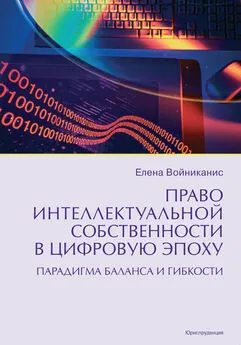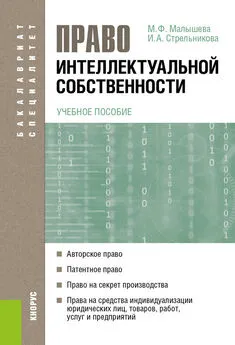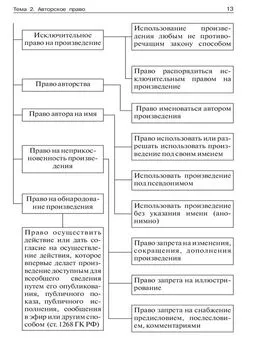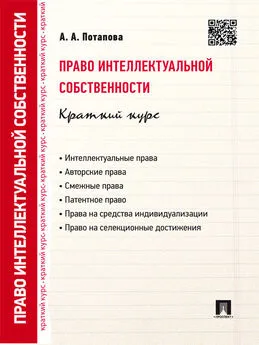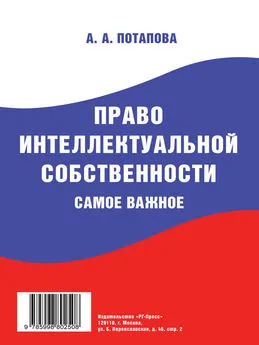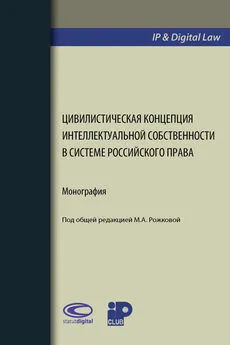Елена Войниканис - Право интеллектуальной собственности в цифровую эпоху. Парадигма баланса и гибкости
- Название:Право интеллектуальной собственности в цифровую эпоху. Парадигма баланса и гибкости
- Автор:
- Жанр:
- Издательство:Литагент «Юриспруденция»f52f92f6-56d8-11e5-8380-0025905a0812
- Год:2014
- Город:М.
- ISBN:978-5-9516-0680-8
- Рейтинг:
- Избранное:Добавить в избранное
-
Отзывы:
-
Ваша оценка:
Елена Войниканис - Право интеллектуальной собственности в цифровую эпоху. Парадигма баланса и гибкости краткое содержание
Настоящая книга является первым в российском и зарубежном праве исследованием, посвященным формированию новой парадигмы права интеллектуальной собственности под влиянием экономики информационного общества.
Автором обосновывается тезис о свободном потоке информации как ценности, требующей правовой защиты, а также о двух базовых принципах новой парадигмы – балансе интересов множественных субъектов и гибкости методов регулирования. Вывод о потребности в системном преобразовании права интеллектуальной собственности опирается на результаты анализа обширного фактического материала и тенденций в развитии международной практики регулирования.
Рекомендовано специалистам в праве интеллектуальной собственности, ученым и студентам, а также всем интересующимся проблемами правовых условий развития науки и культуры в цифровую эпоху.
Право интеллектуальной собственности в цифровую эпоху. Парадигма баланса и гибкости - читать онлайн бесплатно ознакомительный отрывок
Интервал:
Закладка:
78. Mauss M. Essai sur le don. Forme et raison de l’echange dans les societes archa'iques // Mauss M. Sociologie et anthropologie. Paris: Les Presses universitaires de France, 1968.
79. Mazzacano P. The Lex Mercatoria as Autonomous Law. Comparative Research in Law and Political Economy. 2008. Vol. 04. № 6. P. 1–14.
80. McGee W.C. Data Base Technology // IBM Journal of Research and Development, 1981. Vol. 25. № 5. P. 505–519.
81. McLeod K. Freedom of expression: resistance and repression in the age of intellectual property. First University of Minnesota Press edition, 2007.
82. Menell P.S. Intellectual Property: General Theories // Encyclopedia of Law & Economics: Vol. II. Edward Elgar: Cheltenham, UK, 2000.
83. Mgbeoji I. The Juridical Origins of the International Patent System: Towards a Historiography of the Role of Patents in Industrialization // Journal of the History of International Law. 2003. Vol. 5. P. 403–422.
84. Michaels R. The True Lex Mercatoria: Law Beyond the State // Indiana Journal of Global Legal Studies. 2008. Vol. 14. № 2. P. 447–468.
85. Mifsud Bonnici J.P. Self-Regulation In Cyberspace. The Hague: TMC Asser Press, 2008.
86. Mokyr J. Intellectual Property Rights, the Industrial Revolution, and the Beginnings of Modern Economic Growth // American Economic Review. 2009. Vol. 99. Issue 2. P. 349–55.
87. Mokyr J. Intellectual Property Rights, the Industrial Revolution, and the Beginnings of Modern Economic Growth // American Economic Review. 2009. Vol. 99(2). P. 349–355.
88. Mokyr J. The lever of Riches: Technological Creativity and Economic Progress. New York, 1990.
89. Mowery D.C., Nelson R.R., Sampat B.N., Ziedonis A.A. The Growth of Patenting and Licensing by U.S. Universities: An Assessment of the Effects of the Bayh-Dole Act of 1980 // Research Policy. 2001. Vol. 30. Issue 1. P. 99–119.
90. Naugle D.K. Worldview: the history of a concept. Wm. B. Eerd-mans Publishing, 2002.
91. Networks: Legal Issues of Multilateral Co-operation. Ed. by: Marc Amstutz M., Teubner G. UK, Hart Publishing, 2009.
92. Nink J. Rechtliche Rahmenbedingungen von Serviceorientierten Architekturen mit Web Services. Universitätsverlag Göttingen, 2010.
93. Non-State Actor Dynamics in International Law: From Law-Takers to Law-Makers. Ed. by Math Noortmann, and Cedric Ryngaert. Ashgate, 2010.
94. Online Intermediaries: Assessing the Economic Impact of the EU’s Online Liability Regime. Copenhagen Economics. January 2012.
95. Ortino F., Ortino M. Law of the Global Economy: In Need of a New Methodological Approach? // International Economic Law: The State and Future of the Discipline. Ed. by Colin B. Picker, Isabella D. Bunn and Douglas W. Arner. Hart Publishing, 2008. P. 89–106.
96. Patterson R. Copyright in Historical Perspective. Nashville, Vanderbilt University Press, 1968.
97. Pearson H. Origins of law and economics: the economists’ new science of law, 1830–1930. Cambridge University Press, New York, 1997.
98. Peczenik A. On Law and Reason. Springer, 2008.
99. Peer-to-Peer File Sharing and Secondary Liability in Copyright Law. Ed. by Alain Strowel. Edward Elgar Publishing, 2009.
100. Peguera M. The DMCA Safe Harbors and Their European Counterparts: A Comparative Analysis of Some Common Problems // Columbia Journal of Law & the Arts. 2009. Vol. 32. P. 481–512.
101. Petra M. How Do Patent Laws Influence Innovation? Evidence from Nineteenth-Century World’s Fairs //American Economic Review. 2005. Vol. 95. № 4. P. 1214–1236.
102. Philip E. Johnson Reason in the balance: the case against naturalism in science, law and education. Intervarsity Press, 1995.
103. Posner R.A. The Problematics of Moral and Legal Theory. Harvard University Press, 1999.
104. Posner R. A. Law, Pragmatism, and Democracy. Harvard University Press, 2003.
105. Priest G.L. What Economists Can Tell Lawyers About Intellectual Property // Research In Law And Economics, The Economics Of Patents And Copyrights. Ed. by John Palmer. 1986. Vol. 8. P. 19–24.
106. Primary Sources on Copyright (1450–1900). Ed. by L. Bently & M. Kretschmer, 2008.
107. Privilege and property: essays on the history of copyright. Ed.: Ronan Deazley, Martin Kretschmer, Lionel Bently. Open Book Publishers, 2010.
108. Proposal by Argentina and Brazil for the establishment of a development agenda for WIPO. Wipo General Assembly. Thirty-First (15th Extraordinary) Session. WIPO № WO/GA/31/ll.Geneva, September 27 to October 5, 2004.
109. Radin M. J. Humans, Computers and Binding Commitment // Indiana Law Journal. 2000. Vol. 75. Issue 4. P. 1125–1162.
110. Raymond E.S. The Cathedral and the Bazaar. San Francisco: Ignatius Press, 1999.
111. Reed D.P. The Law of the Pack // Harvard Business Review. 2001. Vol. 79. № 2. P. 23–25.
112. Regulating the global information society. Ed. by Christopher T. Marsden. Routledge, 2000.
113. Regulating Technologies: Legal Futures, Regulatory Frames and Technological Fixes. Ed. by Roger Brownsword, Karen Yeung. Hart Publishing, 2008.
114. Reichman J. H., Samuelson P. Intellectual Property Rights in Data? // Vanderbilt Law Review 50, 1997. P. 50–166.
115. Reidenberg J.R. Fourth Annual Baker Botts Lecture: The Rule of Intellectual Property Law in the Internet Economy // Houston Law Review. 2007. Vol. 44. № 4. P. 1074–1095.
116. Reidenberg J.R. Lex Informatica: The Formulation of Information Policy Rules through Technology // Texas Law Review. 1998. № 3. P. 553–594.
117. Reinbothe J., Lewinski S. The WIPO Treaties 1996. L., 2002.
118. Research Handbook on Intellectual Property and Competition Law. Ed. by Josef Drexl. Edward Elgar Publishing, 2008.
119. Rose M. Authors and Owners: The Invention of Copyright. L., 1993.
120. Rose M. Authors and Owners: The Invention of Copyright. Harvard University Press, 1993.
121. Rosen L. Open Source Licensing: Software Freedom and Intellectual Property Law. New Jersey: Pearson Professional Education, 2005.
122. Rowley Ch.K. An intellectual history of law and economics: 1739–2003 // The Origins of Law and Economics: Essays by the Founding Fathers. Edward Elgar Publishing, 2007. P. 3—32.
123. Rowland D., Macdonald E. Information Technology Law. Routledge, 2005.
124. Rubini L. Microsoft on Trial: Legal and Economic Analysis of a Transatlantic Antitrust Case. Edward Elgar Publishing, 2010. P. 205–257.
125. Sailer R.P. Personal Patronage under the Early Empire. Cambridge, 1982.
126. Samuelson P. The Uneasy Case for Software Copyrights Revisited // George Washington Law Review Arguendo. 2011. Vol. 79. Issue 6. P. 1745–1782.
127. Samuelson P. Digital Rights Management [and, or, vs.] the Law // Magazine. Communications of the ACM. 2003. Vol. 46. Issue 4. P. 41–45.
128. Samuelson P., Davis R., Kapar M.D., Reichman J.H. A manifesto concerning the legal protection of computer programs // Columbia Law Review. 1994. Vol. 94. № 8. P. 2308–2431.
129. Schindler G. Wagging the Dog? – Reconsidering Antitrust-Based Regulation of IP-Licensing // Marquette Intellectual Property Law Review. 2008. Vol. 12. № 1. P. 49–88.
130. Science and Technology in Judicial Decision Making: Creating Opportunities and Meeting Challenges. A report of the Carnegie Commission of Science Technology and Government. Diane Publishing Company, 1993.
131. Second progress report on the digitisation and online accessibility of cultural material and on digital preservation in the European Union. 2010.
132. Senden L. Soft Law in European Community Law. Hart Publishing Ltd., 2004.
133. Seville C. EU Intellectual Property Law and Policy. Edward Elgar, 2009.
134. Sherman B., Bently L. The Making of Modern Intellectual Property Law: The British Experience. Cambridge University Press, 1999.
135. Sollfrank К. Performing the Paradoxes of Intellectual Property. A Practice-led Investigation into the Conflicting Relationship between Copyright and Art. The University of Dundee, Duncan of Jordanstone College of Art and Design. November 2011.
136. Stiglitz J.E. More Instruments and Broader Goals: Moving toward the Post-Washington Consensus // Wider Perspectives on Global Development. Ed. by United Nations University-World Institute for Development Economics Research. Palgrave MacMillan, Houndmills, 2005. P. 16–48.
137. Stiglitz J.E. Economic Foundations Of Intellectual Property Rights // Duke Law Journal. 2008. Vol. 57. P. 1693–1723.
138. Stiglitz J.E. Making globalization work. Norton & Company, 2006.
139. Stiglitz J.E. The Overselling of Globalization // Globalization: What’s New? New York: Columbia University Press, 2005. P. 229.
140. Teubner G. Breaking Frames Economic Globalization and the Emergence of lex mercatoria // European Journal of Social Theory. 2002. Vol. 5. № 2. P. 199–217.
141. The British Industrial Revolution: An Economic Perspective. Ed. by Joel Mokyr. Westview Press, 1999.
142. The essential Holmes. Ed. by Richard Posner. University of Chicago Press, 1990.
143. The History of Information Security: A Comprehensive Handbook. Ed. Karl Maria Michael de Leeuw, Jan Bergstra. Elsevier Science. 2007.
144. The interface between Intellectual Property rights and competition policy. Ed. S.D. Anderman. Cambridge University Press, New York, 2007.
145. The New Renaissance, Report of the ‘Comite des Sages’ Reflection group on bringing Europe’s Cultural Heritage online. Brussels, 2011.
146. Understanding Knowledge as a Commons. MIT, 2007.
147. Välimäki M. The Rise of Open Source Licensing: A Challenge to the Use of Intellectual Property in the Software Industry. Helsinki: Turre Publishing, 2005.
148. Van Dijk J. The Network Society: Social Aspects of New Media. SAGE, 2005.
149. Van Dijk T.A. News as discourse. L. Erlbaum Associates, 1988.
150. Veljanovski C. G. Economic principles of law. Cambridge University Press, 2007.
151. Westkamp G. Der Schutz von Datenbanken und Informa-tionssamlungen im britischen und deutschen Recht. Verlag C.H.Beck Muenchen, 2003.
152. Williams R. Culture and Society: 1780–1950. Anchor Books, 1960.
153. Woodmansee M. The Genius and the Copyright: Economic and Legal Conditions of the Emergence of the «Author» // Eighteenth-Century Studies. 1984. Vol. 17. № 4. P. 425–448.
154. Александровский Ю.В. Авторское право. Исторический очерк, законодательные мотивы и разъяснения. СПб.: Товарищество по изданию новых законов, 1911.
155. Андерсон К. Длинный хвост: новая модель ведения бизнеса. М.: Вершина, 2008.
156. Бальсевич А.А… Экономика права: предпосылки возникновения и история развития // Вопросы экономики. 2008. № 12. С. 60–71.
157. Бахтин М.М. Эстетика словесного творчества. 2-е изд. М.: Искусство, 1986.
158. Беляева Е.Н., Доронин М.Г. Объект интеллектуальной собственности: сущность и понятие // Проблемы правовой информатизации. 2007. № 1. С. 37–40.
159. Бентам И. Введение в основания нравственности и законодательства. М.: РОССПЭН, 1998.
160. Берман Г.Дж. Западная традиция права: эпоха формирования. М.: Изд-во МГУ; Изд. группа ИНФРА-М – НОРМА, 1998.
Читать дальшеИнтервал:
Закладка:
